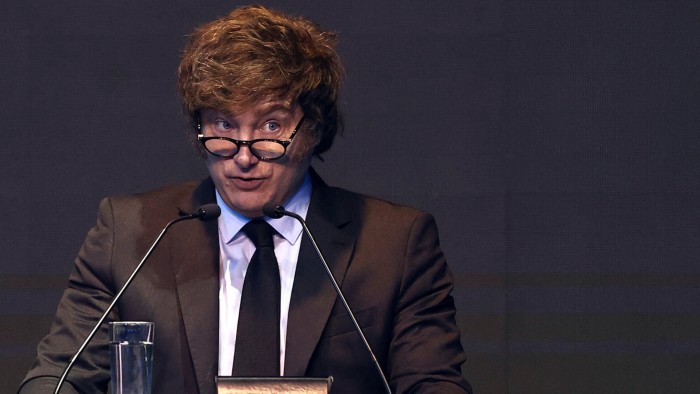Unlock the Editor’s Digest for free
Roula Khalaf, Editor of the FT, selects her favourite stories in this weekly newsletter.
Argentina has said it will tighten its historically loose migration rules, as libertarian President Javier Milei cuts costs and deepens his political alignment with hard-right leaders in the US and Europe.
Argentina would ban people convicted of crimes from entering, rapidly deport those who commit crimes inside the country, set financial requirements for residency and charge migrants to access public healthcare and education, presidential spokesperson Manuel Adorni told reporters on Wednesday.
“We have for a while had an immigration regime that invites chaos and abuse,” Adorni said, citing heavy spending on public services for foreigners. “It’s time to honour our history and make Argentina great again.”
The reforms, while less extreme than hardline migration policies implemented by Milei’s ally US President Donald Trump, are a departure for Argentina. The nation is largely descended from immigrants and migration has rarely been a big political issue, with many paths to legal residency and relatively lax migration enforcement.
It reflects Milei’s blending of his economic mandate to end Argentina’s chronic overspending with a rightwing social agenda. The president has previously closed government departments tasked with tackling gender and racial discrimination, which he said had spent large budgets with limited results.
In a speech at the World Economic Forum in January, the libertarian economist said “woke ideology” was a “cancer that must be removed”.
Adorni’s announcement aimed to appeal to conservative voters in Buenos Aires ahead of Sunday’s closely watched local elections, in which he is the main candidate for Milei’s La Libertad Avanza party, said Juan Cruz Díaz, managing director of Latin America advisory Cefeidas Group.
“La Libertad Avanza is trying to beat out centre-right parties for dominance of the rightwing vote,” he said. “The city is probably where concern about migrants flooding public services is most pronounced in Argentina.”
Cruz Díaz added: “The government’s angle is more economic than xenophobic . . . the latter is not a dominant part of the national debate in Argentina.”
Adorni said that eight public hospitals nationwide had jointly spent 114bn pesos, about $100mn, on treating foreigners in 2024.
He added that the new healthcare charges would put an end to “health tourism”, in which foreigners enter Argentina to receive free healthcare before returning home, a big complaint of rightwing leaders in the country’s northern provinces bordering Bolivia and Paraguay.
The reforms, set to be implemented through a presidential decree in the coming days, also include requirements for receiving Argentine citizenship, including spending two years inside the country uninterrupted.
Read the full article here




